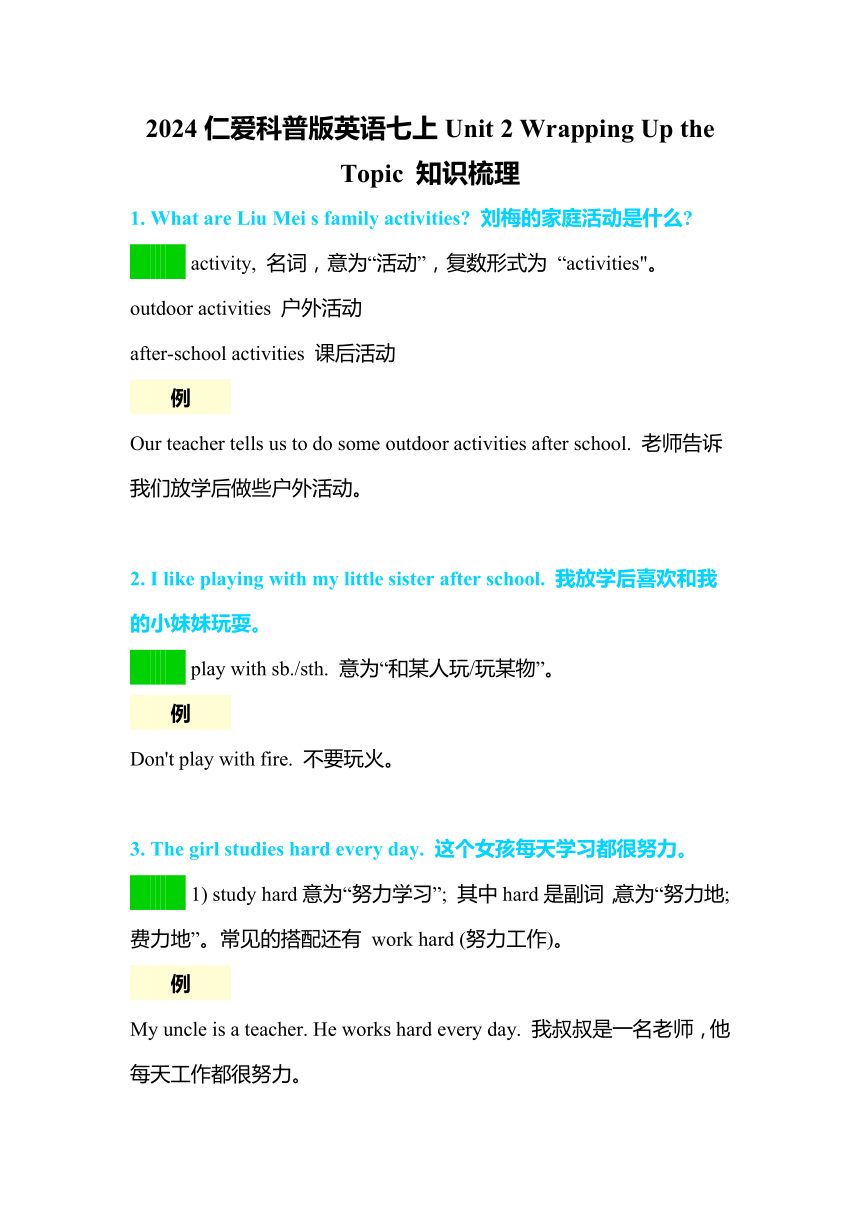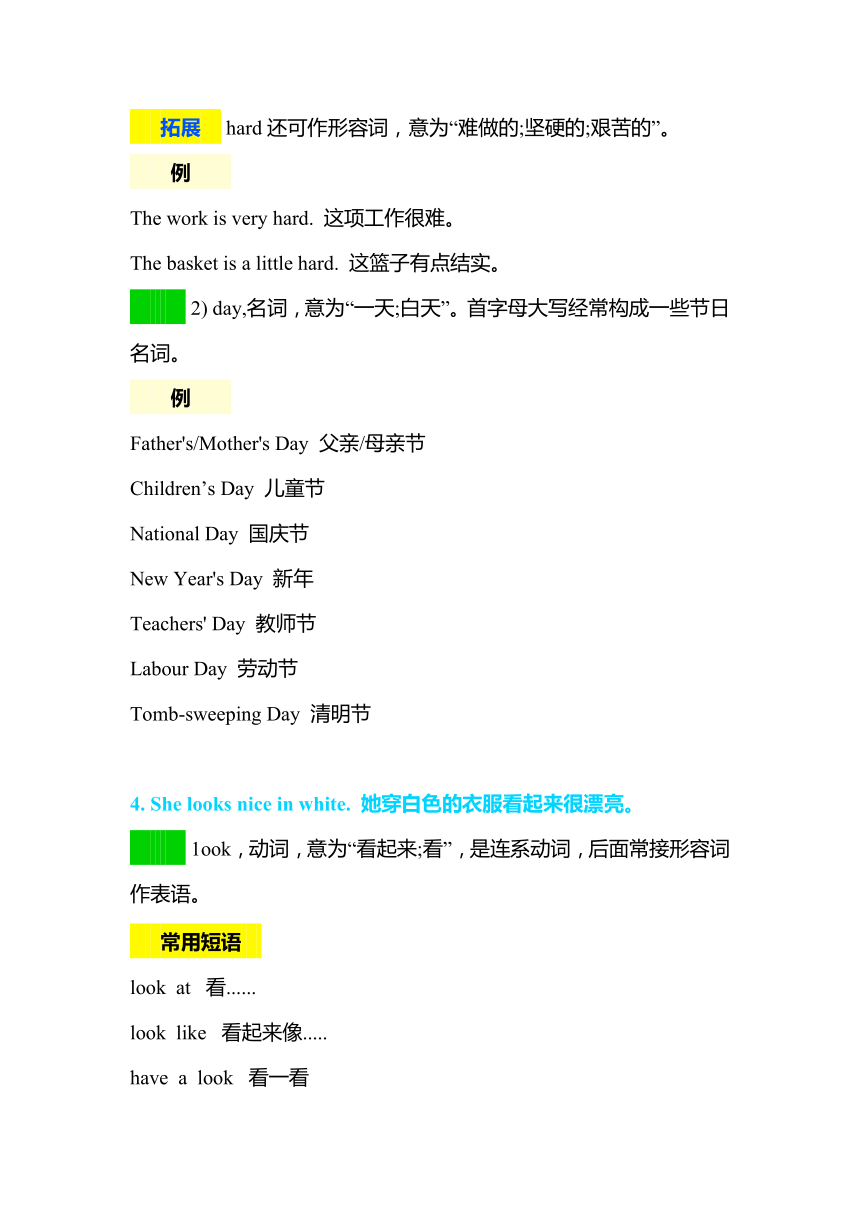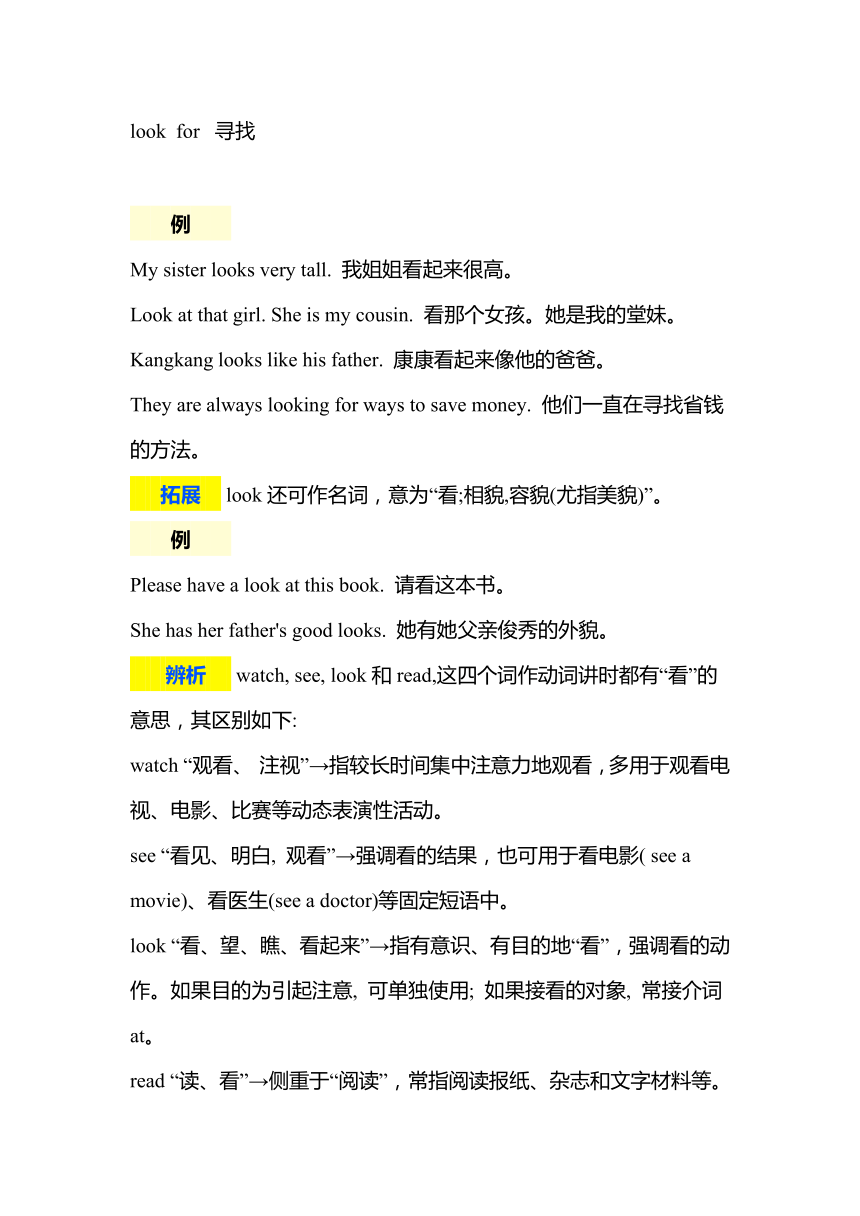仁爱科普版(2024)七年级上册Unit 2 Meet My Family! Wrapping up the Topic 知识梳理
文档属性
| 名称 | 仁爱科普版(2024)七年级上册Unit 2 Meet My Family! Wrapping up the Topic 知识梳理 |  | |
| 格式 | docx | ||
| 文件大小 | 23.0KB | ||
| 资源类型 | 教案 | ||
| 版本资源 | 仁爱科普版 | ||
| 科目 | 英语 | ||
| 更新时间 | 2024-10-05 20:25:00 | ||
图片预览



文档简介
2024仁爱科普版英语七上Unit 2 Wrapping Up the Topic 知识梳理
1. What are Liu Mei s family activities 刘梅的家庭活动是什么
activity, 名词,意为“活动”,复数形式为 “activities"。
outdoor activities 户外活动
after-school activities 课后活动
例
Our teacher tells us to do some outdoor activities after school. 老师告诉我们放学后做些户外活动。
2. I like playing with my little sister after school. 我放学后喜欢和我的小妹妹玩耍。
play with sb./sth. 意为“和某人玩/玩某物”。
例
Don't play with fire. 不要玩火。
3. The girl studies hard every day. 这个女孩每天学习都很努力。
1) study hard意为“努力学习”; 其中hard是副词,意为“努力地;费力地”。常见的搭配还有 work hard (努力工作)。
例
My uncle is a teacher. He works hard every day. 我叔叔是一名老师,他每天工作都很努力。
拓展 hard还可作形容词,意为“难做的;坚硬的;艰苦的”。
例
The work is very hard. 这项工作很难。
The basket is a little hard. 这篮子有点结实。
2) day,名词,意为“一天;白天”。首字母大写经常构成一些节日名词。
例
Father's/Mother's Day 父亲/母亲节
Children’s Day 儿童节
National Day 国庆节
New Year's Day 新年
Teachers' Day 教师节
Labour Day 劳动节
Tomb-sweeping Day 清明节
4. She looks nice in white. 她穿白色的衣服看起来很漂亮。
1ook,动词,意为“看起来;看”,是连系动词,后面常接形容词作表语。
常用短语 look at 看...... look like 看起来像..... have a look 看一看 look for 寻找
例
My sister looks very tall. 我姐姐看起来很高。
Look at that girl. She is my cousin. 看那个女孩。她是我的堂妹。
Kangkang looks like his father. 康康看起来像他的爸爸。
They are always looking for ways to save money. 他们一直在寻找省钱的方法。
拓展 look还可作名词,意为“看;相貌,容貌(尤指美貌)”。
例
Please have a look at this book. 请看这本书。
She has her father's good looks. 她有她父亲俊秀的外貌。
辨析 watch, see, look和read,这四个词作动词讲时都有“看”的意思,其区别如下:
watch “观看、 注视”→指较长时间集中注意力地观看,多用于观看电视、电影、比赛等动态表演性活动。
see “看见、明白, 观看”→强调看的结果,也可用于看电影( see a movie)、看医生(see a doctor)等固定短语中。
look “看、望、瞧、看起来”→指有意识、有目的地“看”,强调看的动作。如果目的为引起注意, 可单独使用; 如果接看的对象, 常接介词at。
read “读、看”→侧重于“阅读”,常指阅读报纸、杂志和文字材料等。
例
I like watching TV. 我喜欢看电视。
Does he love watching football games 他喜欢看足球赛吗
I often see him walking the dog in the park. 我经常看见他在公园遛狗。
Oh! I see. 哦!我明白了。
She often sees a movie in the evening. 她经常晚上看电影。
Please look at the blackboard. 请看黑板。
Look! That is my mother. 看!那是我妈妈。
She looks happy. 她看起高兴。
Kangkang enjoys reading books. 康康喜欢看书。
5. She looks after the old in an oldpeople's home. 她在一家养老院照顾老人。
1) look after sb./sth. 意为“照顾,照看”,可与take care of 互换。
例
Liu Mei often looks after her little brother.
= Liu Mei often takes care of her little brother. 刘梅经常照顾她的弟弟。
拓展 look after sb./sth. well = take good care of sb./sth. 意为“好好照顾某人/某物”。
例
Does he look after this cat well
=Does he take good care of this cat 他能照顾好这只猫吗
2) the old意为“老人”。“the +形容词”表示这一类人/物。
例
the young 年轻人
the poor 穷人
3) old people's home 意为“养老院”
例
I want to visit the old people's home with my friends. 我想和我的朋友们去拜访养老院。
6. They help a lot in looking after the family. 他们在照顾家庭方面帮了很多忙。
a lot, 副词短语,意为“非常,很”,常放在动词后面,表强调。help a lot表示帮助很大。
例
I like drawing a lot. 我很喜欢画画。
拓展 lot还可作限定词,意为“大量、许多”,常构成的短语有a lot of/ lots of(许多,大量),后接可数名词复数形式或不可数名词。
例
She has a lot of/ lots of friends. 她有好多朋友。
I drink a lot of/ lots of water every day. 我每天都喝很多水。
7. What other things do you know about Lin Hua's family 关于林华的家庭你还知道些什么
1) other, 形容词,意为“其他的”,后常跟可数名词复数形式。
例
other books 其他的书
辨析 other, the other, others 和the others
other 意为“另外的;其他的”,常用来修饰可数名词复数。但是如果前面有the, some, any, every, no, one, my, your等时,可与单数名词连用。
the other 表示已知的两个(或两部分)人或事物中,特指的“另一个”或“另一些”。常用于“one... the other...”结构中,意为“一个......另一个.....”。
others 代词,泛指“其他的人或物”,相当于“other +可数名词复数”用于已知的一些人或物中,除去某些后余下的人或物中的一部分。常用于“some... others..." 结构中,意为“一些......, 另一些”。
the others 特指在一定范围内除去一个或一部分之后,余下的全部的人或物,相当于“the other+可数名词复数”。
例
We study Chinese, math, English and other subjects. 我们学习语文、数学、英语和其他学科。
I have two books. One is about English, and the other is about Chinese. 我有两本书,一本关于英语,另一本关于语文。
There are many people in the park. Some are walking the dog, and others are playing soccer. 许多人在公园。一些人在遛狗, 另一些人在踢足球。
There are five people in the room. Two of them are from Henan and the others come from Beijing. 房间里有5个人。其中两个人来自河南,剩下的三个来自北京。
2) know about + sb./sth. 意为“得知/熟悉/了解关于...的情况”。
例
I want to know about your school. 我想了解一下你学校的情况。
拓展 ①know more about sth./sb. 意为“对某事/某人了解更多”。
例
Do you want to know more about my school life 你想更多的了解我的学校生活吗
② know... from... 意为“从.....了解到关于.....”。
例
I know about the school web page from him. 我从他那里了解到关于学校的网页。
1. What are Liu Mei s family activities 刘梅的家庭活动是什么
activity, 名词,意为“活动”,复数形式为 “activities"。
outdoor activities 户外活动
after-school activities 课后活动
例
Our teacher tells us to do some outdoor activities after school. 老师告诉我们放学后做些户外活动。
2. I like playing with my little sister after school. 我放学后喜欢和我的小妹妹玩耍。
play with sb./sth. 意为“和某人玩/玩某物”。
例
Don't play with fire. 不要玩火。
3. The girl studies hard every day. 这个女孩每天学习都很努力。
1) study hard意为“努力学习”; 其中hard是副词,意为“努力地;费力地”。常见的搭配还有 work hard (努力工作)。
例
My uncle is a teacher. He works hard every day. 我叔叔是一名老师,他每天工作都很努力。
拓展 hard还可作形容词,意为“难做的;坚硬的;艰苦的”。
例
The work is very hard. 这项工作很难。
The basket is a little hard. 这篮子有点结实。
2) day,名词,意为“一天;白天”。首字母大写经常构成一些节日名词。
例
Father's/Mother's Day 父亲/母亲节
Children’s Day 儿童节
National Day 国庆节
New Year's Day 新年
Teachers' Day 教师节
Labour Day 劳动节
Tomb-sweeping Day 清明节
4. She looks nice in white. 她穿白色的衣服看起来很漂亮。
1ook,动词,意为“看起来;看”,是连系动词,后面常接形容词作表语。
常用短语 look at 看...... look like 看起来像..... have a look 看一看 look for 寻找
例
My sister looks very tall. 我姐姐看起来很高。
Look at that girl. She is my cousin. 看那个女孩。她是我的堂妹。
Kangkang looks like his father. 康康看起来像他的爸爸。
They are always looking for ways to save money. 他们一直在寻找省钱的方法。
拓展 look还可作名词,意为“看;相貌,容貌(尤指美貌)”。
例
Please have a look at this book. 请看这本书。
She has her father's good looks. 她有她父亲俊秀的外貌。
辨析 watch, see, look和read,这四个词作动词讲时都有“看”的意思,其区别如下:
watch “观看、 注视”→指较长时间集中注意力地观看,多用于观看电视、电影、比赛等动态表演性活动。
see “看见、明白, 观看”→强调看的结果,也可用于看电影( see a movie)、看医生(see a doctor)等固定短语中。
look “看、望、瞧、看起来”→指有意识、有目的地“看”,强调看的动作。如果目的为引起注意, 可单独使用; 如果接看的对象, 常接介词at。
read “读、看”→侧重于“阅读”,常指阅读报纸、杂志和文字材料等。
例
I like watching TV. 我喜欢看电视。
Does he love watching football games 他喜欢看足球赛吗
I often see him walking the dog in the park. 我经常看见他在公园遛狗。
Oh! I see. 哦!我明白了。
She often sees a movie in the evening. 她经常晚上看电影。
Please look at the blackboard. 请看黑板。
Look! That is my mother. 看!那是我妈妈。
She looks happy. 她看起高兴。
Kangkang enjoys reading books. 康康喜欢看书。
5. She looks after the old in an oldpeople's home. 她在一家养老院照顾老人。
1) look after sb./sth. 意为“照顾,照看”,可与take care of 互换。
例
Liu Mei often looks after her little brother.
= Liu Mei often takes care of her little brother. 刘梅经常照顾她的弟弟。
拓展 look after sb./sth. well = take good care of sb./sth. 意为“好好照顾某人/某物”。
例
Does he look after this cat well
=Does he take good care of this cat 他能照顾好这只猫吗
2) the old意为“老人”。“the +形容词”表示这一类人/物。
例
the young 年轻人
the poor 穷人
3) old people's home 意为“养老院”
例
I want to visit the old people's home with my friends. 我想和我的朋友们去拜访养老院。
6. They help a lot in looking after the family. 他们在照顾家庭方面帮了很多忙。
a lot, 副词短语,意为“非常,很”,常放在动词后面,表强调。help a lot表示帮助很大。
例
I like drawing a lot. 我很喜欢画画。
拓展 lot还可作限定词,意为“大量、许多”,常构成的短语有a lot of/ lots of(许多,大量),后接可数名词复数形式或不可数名词。
例
She has a lot of/ lots of friends. 她有好多朋友。
I drink a lot of/ lots of water every day. 我每天都喝很多水。
7. What other things do you know about Lin Hua's family 关于林华的家庭你还知道些什么
1) other, 形容词,意为“其他的”,后常跟可数名词复数形式。
例
other books 其他的书
辨析 other, the other, others 和the others
other 意为“另外的;其他的”,常用来修饰可数名词复数。但是如果前面有the, some, any, every, no, one, my, your等时,可与单数名词连用。
the other 表示已知的两个(或两部分)人或事物中,特指的“另一个”或“另一些”。常用于“one... the other...”结构中,意为“一个......另一个.....”。
others 代词,泛指“其他的人或物”,相当于“other +可数名词复数”用于已知的一些人或物中,除去某些后余下的人或物中的一部分。常用于“some... others..." 结构中,意为“一些......, 另一些”。
the others 特指在一定范围内除去一个或一部分之后,余下的全部的人或物,相当于“the other+可数名词复数”。
例
We study Chinese, math, English and other subjects. 我们学习语文、数学、英语和其他学科。
I have two books. One is about English, and the other is about Chinese. 我有两本书,一本关于英语,另一本关于语文。
There are many people in the park. Some are walking the dog, and others are playing soccer. 许多人在公园。一些人在遛狗, 另一些人在踢足球。
There are five people in the room. Two of them are from Henan and the others come from Beijing. 房间里有5个人。其中两个人来自河南,剩下的三个来自北京。
2) know about + sb./sth. 意为“得知/熟悉/了解关于...的情况”。
例
I want to know about your school. 我想了解一下你学校的情况。
拓展 ①know more about sth./sb. 意为“对某事/某人了解更多”。
例
Do you want to know more about my school life 你想更多的了解我的学校生活吗
② know... from... 意为“从.....了解到关于.....”。
例
I know about the school web page from him. 我从他那里了解到关于学校的网页。
同课章节目录
